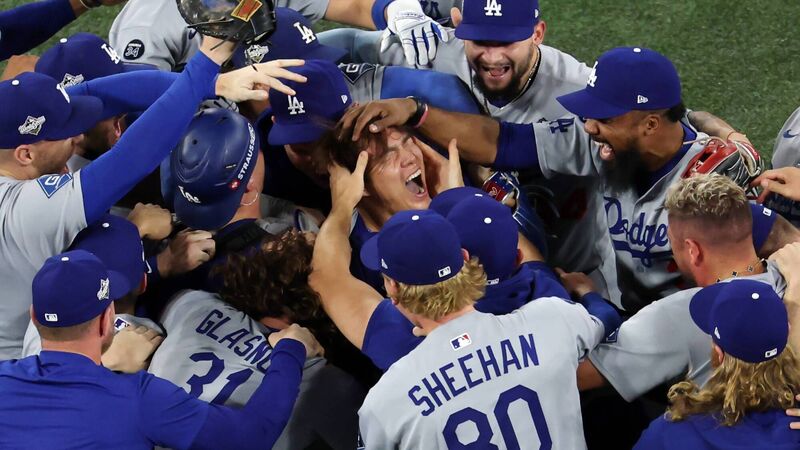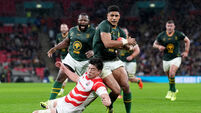Colin Sheridan: Baseball forever young thanks to memorable World Series

AMERICA'S PASTIME: Pitcher Yoshinobu Yamamoto of the Los Angeles Dodgers celebrates with teammates after defeating the Toronto Blue Jays 5-4 in game seven. Pic: Patrick Smith/Getty Images
Somewhere between the crack of a bat and the exhale of a nation, there exists a peculiar hush. It is not silence exactly, but the sort of expectant quiet that visits confessionals and maternity wards. Baseball’s alchemy has always lived in this vacuum. And when October baseball creeps into November, it is at its most poetically profound. On Saturday night in Toronto, in Game 7 of the World Series, it reminded us why.
Baseball is a sport people love to bury. Too slow, they say. Too quaint. Too bound to the sepia-toned ghosts of cigar-chewing managers and boys named Grover. Football has conquered the headlines; basketball, the posterising glitter. Baseball, we are told, belongs to Norman Rockwell paintings and fathers with rolled-up shirt sleeves tossing pitches to their kids at sunset - not the roaring algorithms of modern sport.
Yet there we were - millions of us foolish believers, many of them in Ireland - watching the final chapter of a season unfold like a poem written on a leather-stitched page. Forty-six thousand fans packed into the stadium humming with nerves, as if the floodlights might flicker under the weight of collective breath.
Game 7. A phrase that requires no embellishment; two words capable of setting every tendon in your neck thrumming, regardless of your knowledge in the sport. For there is no tomorrow in Game 7. No tactical resting of starters, no “We go again.” And baseball - dear old baseball, the supposedly elderly uncle of sport - delivered. If you've been paying attention, it’s been delivering all season.
Early on, the Blue Jays grabbed air. In the third inning, Bo Bichette unleashed a three-run home run off the Dodger starter Shohei Ohtani, chasing the two-way superstar from the mound. The Dodgers were behind and feeling it. Bichette’s blast felt ancient, classical, one of those moments you hold in your throat. And yet, that was only the beginning. Because baseball gives you time. It gives you hope. It gives you that extra inning when so many sports would have already called it.
In the ninth inning, with two outs and the Dodgers down 4-2, along came Miguel Rojas. He cracked a slider over the wall for a solo home run - and just like that, the game was tied. It was historic: the first game-tying homer in the ninth inning of a Game 7. A Toronto fan caught the ball in his glove, an act that could make him a lot of money. Instead, he threw it back to the field, his disgust comically palpable. In the subsequent outs, Toronto came within inches of scoring the run that would win them all the marbles. Glory delayed, it turns out, would be glory denied.
And then came the 11th, with two outs, up stepped Will Smith. He belted a solo home run off that put the Dodgers ahead for good. That blast made history too - the first extra-inning homer in a winner-take-all World Series game. In the bottom of the extra inning, well past midnight, after benches had cleared and fingernails were chewed to stubs, the Dodgers sealed it with a game-ending double play.
In the clutch, a name emerges: Yoshinobu Yamamoto. The man who, after throwing over 90 pitches the night before, pitched the final two-plus innings, allowing just one hit, was named World Series MVP.
This is what the games critics forget: baseball does not shout - it whispers. It seduces. It lingers like the smell of cut grass in spring and the sound of a radio calling balls and strikes in a back-kitchen somewhere in Ohio - or Offaly, if you’ve ever found yourself lost on American cable sports channels at 2am.
On Saturday night, the sport did what it has always done. It stretched time. It stretched hearts. It asked us to wait, to savour, to feel the exquisite agony of a full count with runners on second and third, one run separating triumph from grief. The ballpark became a chapel, the crowd its fervent congregation. Even those watching from couches continents away could sense the liturgy.
And in that pause between pitch and contact - longer than logic, shorter than hope - we remembered why baseball existed long before we judged a sport’s value by viral moments and betting apps. It is the romance of failure. The mortal beauty of trying and missing seven times out of 10 and still being considered great. It is the only sport where patience is a weapon, and panic the surest death. You cannot simply run out the clock in baseball; you must face it, pitch by terrifying pitch, until it finally releases you.
When the final out settled into a glove, and the Dodgers surged in the dugout, you could almost hear the game chuckle softly to its doubters. Museum piece? No. This was not nostalgia. That was life, unfiltered and earnest, the currency sport once dealt in before it got drunk on spectacle. Baseball sometimes strolls. Sometimes, it spits into the dirt and adjusts its cap. Sometimes, it waits until the seventh game, the 11th inning, and the last desperate swing.
They can call it old. They can call it slow. But last Saturday night, under November lights that looked like they might burn forever, baseball was young again. And so were those who stayed awake long enough to witness it.
Hardly a week goes by in this country without a good young fella packing a bag, grabbing a passport, and stepping into the slipstream of Irish sport’s most modern migration. And now, it appears, the latest name is Kobe MacDonald - a Mayo lad with the stride of youth, the touch of promise, and the sort of raw potential that catches the eye of Australian talent scouts faster than you can say “forty-metre kick pass.” Of course, few will begrudge him. Opportunity knocks, and when it has a suntan and a professional wage attached, it tends to knock louder. The AFL offers a life less ordinary: sun-bleached ovals, sports science by the bucketload, and a career path that doesn’t require juggling college, part-time jobs, and winter training in horizontal rain. Still, something twists in the Irish stomach when it happens. We dress it up as admiration, but beneath it sleeps a quiet fear: is Gaelic football becoming an amateur nursery for a professional Australian machine? Kobe is merely the latest case study in a thesis Mayo supporters never wanted to write. You dream of him in the green and red, hitting clutch winners in Castlebar, not fielding marks in Melbourne. This isn’t about shackles; young players deserve autonomy, adventure even. But the GAA and the AFL need to finally sit down like two sensible neighbours arguing over a borrowed strimmer and sort out a formal agreement. A talent pathway that respects Irish development, compensation for counties and clubs, and some safeguard against opportunistic swoops. Otherwise, every promising minor who rises above the pack risks being seen through a binocular lens from the other side of the world.
For now, Mayo will wish Kobe well if he goes, because that’s what we do: we sigh, we smile, we hope he brings a bit of home with him. But somewhere between Crossmolina and the departure gate, a question lingers: how many more? And at what cost to the games that formed them?
Limerick’s Ava Crean is only 19, yet already she’s bending the logic of Irish distance running. Her 2:34:12 in Dublin - a metronomic 3:39 per kilometre - was less a run than a declaration. To appreciate its audacity, recall Catherina McKiernan’s Irish record of 2:22:23, set in Amsterdam in 1998, a time that has weathered generations. Most elite women don’t peak until around 30, which leaves Crean not so much time as miles of runway. Where others grind towards their ceiling, she appears to be locating her floor. If this is her raw, unpolished self, then the future feels less hypothetical than inevitable. A decade of development sits before her. Somewhere ahead, impossible things suddenly look like targets.
In Glasgow, where subtlety is rationed like sunshine and Celtic’s sense of injustice is carbon-dated, we find ourselves in another week of virtuous fury. Brendan Rodgers departed Parkhead smiling like a man enduring a tax audit. Then Dermot Desmond descended from Mount Monaco with a statement so pointed it could slice turf - a broadside that reads like the world’s first boardroom break-up ballad. Is this the new standard? The “it’s not me, it’s you” of sporting diplomacy? If self-righteousness were trophies, Celtic might need a bigger cabinet. One thing is for certain, Rodgers, like his smile that can be seen from space, will not go quietly.



